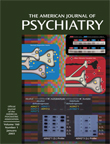To the Editor: The failure of ethyl eicosapentaenoic acid (EPA) (omega-3 fatty acid) to produce improvement over placebo in patients with chronic schizophrenia treated with standard drugs in a study by Wayne S. Fenton, M.D., and colleagues
(1) has several possible explanations. First, ethyl EPA may have no beneficial effect. This may be a premature conclusion since it is unlikely that any standard drug would show benefit in a trial with this add-on design.
Second, ethyl EPA may have no beneficial effects in patients with a long history of schizophrenia who are presumably taking optimal doses of standard antischizophrenia drugs. The best results in previous studies
(2–
4), two of which were randomized and placebo controlled, were in patients with a short illness history who were not receiving standard drugs. Neuroleptics may reduce or block response to ethyl EPA. However, Emsley et al.
(5) recently reported a robust beneficial effect of ethyl EPA on both schizophrenic symptoms and tardive dyskinesia in a placebo-controlled trial in patients with chronic illness.
A third possibility is that the dose was wrong. Previous studies have used 1–2 g/day rather than the 3 g/day used by Dr. Fenton et al.
(1). We conducted a dose-ranging add-on study of schizophrenia patients in which placebo was compared with 1 g/day, 2 g/day, or 4 g/day of ethyl EPA
(6). The best results were achieved at the 2-g/day dose, which produced an increase in red cell EPA without any decrease in red cell arachidonic acid. At 4 g/day, there was no beneficial effect, and the increase in red cell EPA was accompanied by a substantial decrease in arachidonic acid, a fatty acid that plays a central role in many neuronal signal transduction systems
(7). A similar dose-ranging study in depression
(8) also showed a bell-shaped dose-response curve, with a strong beneficial effect at an ethyl EPA dose of 1 g/day and smaller effects at higher doses. The large decrease in the arachidonic acid/EPA ratio reported by Dr. Fenton et al. suggests that the ethyl EPA dose may have been too high because it depleted arachidonic acid.
Fourth, through the informed consent process, patients may have become knowledgeable about the beneficial effects of EPA and changed their diet by consuming EPA-rich foods. In the placebo group, the arachidonic acid/EPA ratio fell by 4.0 points during the study. This is a large decrease, indicative of a substantial change in diet. In our dose-ranging study, we observed a similar decrease in the arachidonic acid/EPA ratio (–4.2) in the group of patients given 1 g/day of ethyl EPA
(6). The original data of Dr. Fenton et al. (1) do show that red cell EPA levels rose significantly (p<0.05) in the placebo group. The placebo patients may therefore have increased their EPA intake by a suboptimal but still beneficial level, while the actively treated patients may have received too much. This may explain why both groups improved.
The study’s failure may have been due to a combination of an insensitive trial design, a blocking effect of standard drugs, too high a dose of ethyl EPA in the active group, and a dietary increase in EPA in the placebo group. Further studies are required, particularly with lower doses of ethyl EPA in otherwise untreated patients, before any firm conclusions can be drawn. Such studies are important because ethyl EPA is so well tolerated. Of 43 patients receiving ethyl EPA, only six (14%) dropped out during the 16-week study—none because of side effects. In the dose-ranging study of depression
(8), only 12% of the patients taking any ethyl EPA dropped out, while in the dose-ranging schizophrenia study
(6), only 11% dropped out. These dropout rates are much lower than those seen with standard antidepressant or antischizophrenia drugs. Even a modest beneficial effect would be valuable if produced by such a safe drug.

